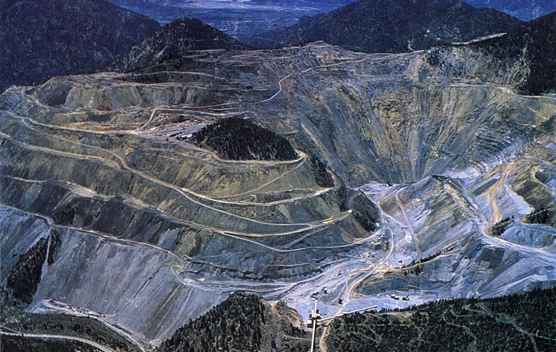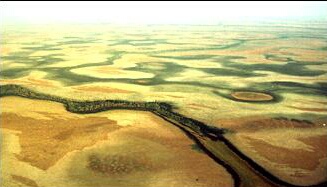|
Humans Stress Ecosystems To, Past Their Limits? The human impact on natural ecosystems has reached dangerous levels, according to US conservationists. A report by the Washington DC-based World Resources Institute (WRI) says human activities have also begun to significantly alter the Earth's basic chemical cycles. The report is the result of a collaboration between WRI, the United Nations Development and Environment Programmes, and the World Bank. It calls on policymakers to use an ecosystem-based approach when negotiating international agreements. The global assessment of the state of coastal, forest, grassland, freshwater and agricultural ecosystems was released in the Norwegian city of Bergen during a conference of world environment ministers. It painted a gloomy picture of over-fished oceans, excessive pumping of water for farming, and destruction of coral reefs and forests. Satellite data The document is based on a $4m investigation, the Pilot Assessment of Global Ecosystems, PAGE, that used about 100 earlier assessments of various ecosystems and regions, as well as new data from satellite imaging and other forms of remote sensing. PAGE will be followed by a larger $20m Millennium Ecosystem Assessment, due to begin in 2001. "Every measure used by scientists to assess the health of the world's ecosystems tells us that we are drawing on them more than ever and degrading them at an accelerating pace," Dr Klaus Topfer, executive director of the UN Environment Programme said in a statement. "We depend on ecosystems to sustain us, and their continued good health depends, in turn, on how we take care of them," he added. The report identified several examples of the stresses human activities are causing on the world's major ecosystems: * half the world's wetlands were lost during the last century; * logging and land conversion have reduced forest cover by at least 20%, and possibly by as much as 50%; * about 9% of the world's tree species are at risk of extinction; * nearly 70% of the world's major marine fish stocks are either overfished, or are being fished at their biological limit; * in the last half century, soil degradation has affected two-thirds of the world's agricultural land. Water demand The effect of the growing demand for water is also singled out in the report. "Dams and engineering works have strongly or moderately fragmented 60% of the world's large river systems. They have so impeded flows that the length of time it takes the average drop of river water to reach the sea has tripled." And the authors say it is not simply individual ecosystems that are being stressed to the limits. "Human activities are significantly altering the basic chemical cycles that all ecosystems depend on. "This strikes at the foundation of ecosystem functioning and adds to the fundamental stresses that ecosystems face at a global scale." The report expresses particular concern about increased levels of carbon dioxide and nitrogen. And the authors say too little attention is paid at any level to the role ecosystems play in sustaining life. "In most nations, and in most local practices, there is little use of the idea of ecosystems as essential biological elements that touch daily life and business. At an international level, there is little use of the ecosystem approach when shaping agreements on trade, agriculture, forests, or water use. "Every measure used by scientists to assess the health of the world's ecosystems tells us that we are drawing on them more than ever and degrading them at an accelerating pace," said Dr. Klaus T'pfer, Executive Director of the United Nations Environment Programme. "We depend on ecosystems to sustain us, and their continued good health depends, in turn, on how we take care of them." Over 175 scientists contributed to this global research effort, which took more than two years to complete. "For too long we have focused on how much we can take from our ecosystems, with little attention to the services that they provide," said Thomas Johansson, Director of UNDP's Energy and Atmosphere Programme. "Ecosystems provide essential services like climate control and nutrient recycling that we cannot replace at any reasonable price." The scorecards and the statistics in People and Ecosystems paint a dismal picture of over-fished oceans, over-pumping of water for farming, destruction of coral reefs and forests, even too much tourism. The report identifies human population growth and increasing consumption as the two principal drivers of the decline of the world's ecosystems. "Stripped of its ecosystems, Earth would resemble the stark, lifeless images beamed back from Mars in 1997," People and Ecosystems reports. The study recommends that governments and people must view the sustainability of ecosystems as essential to human life. It calls for an ecosystems approach to managing the world's critical resources, which means evaluating decisions on land and resource use in light of how they affect the capacity of ecosystems to produce goods and services. "We already know enough to begin to manage ecosystems sustainably. We can restore some of the natural productivity we have lost," said Jonathan Lash, President of WRI. "Many of the 'fixes' are simple and non-technical." The report contains case studies from all over the world on how people are acting to reverse the damage to their ecosystems. In South Africa, people are restoring the ecosystem by uprooting invasive trees. In Dhani, India, communities use watchmen and patrols, simple harvest plans, and bans on cattle grazing in order to restore their community forests. In Machakos, Kenya, the Akamba people collect rainwater and construct terraces-a practice dating back to ancient times in many parts of the world. Lash added that while our knowledge of ecosystems has increased dramatically, it has not kept pace with our ability to alter them. "Our failure to think in terms of ecosystems has been rooted in our profound lack of information about how ecosystems affect us and what condition they are in," he said. Lessons drawn from People and Ecosystems suggest four basic tenets of an ecosystem approach * Tackle the information gap. Managing ecosystems effectively requires a detailed understanding of their current condition and how they function. * Engage in a public dialog on goals, policies, and trade-offs. Dramatic improvements in ecosystem condition and capacity are possible when governments and nongovernmental organizations create opportunities to air diverse ideas about ecosystem management. * Recognize the value of ecosystem services. Removing subsidies and explicitly pricing ecosystem services can be politically difficult but can promote more efficient resource use. * Involve local communities in managing ecosystems. Local communities are often the most prudent ecosystem managers. Involving local communities can also yield a more equitable distribution of the benefits and costs of ecosystem use. "If we are to make sound ecosystem management decisions in the 21st century, dramatic changes are needed in the way we use the knowledge and experience at hand and the range of additional information we need, " said Dr. Robert T. Watson, Chief Scientist and Director for Environmentally and Socially Sustainable Development of the World Bank. Learn from History or be history In the 1980s, the world woke up to the threat of the ozone hole, and in the 1990s it began to realize the dangers of climate change. Now, if a survey Thursday has its intended effect, there'll be a new environmental focus: Earth's ecosystems. Some 175 scientists working with two U.N. agencies, the World Bank and an environmental group say in the survey that people are destroying the planet's forests, coral reefs and other habitats at an ever-faster rate. "EVERY MEASURE used by scientists to assess the health of the world's ecosystems tells us that we are drawing on them more than ever and degrading them at an accelerating pace," Klaus T"pfer, head of the U.N. Environment Program, said in a statement accompanying the report. Five ecosystems were graded based on their ability to benefit humans as: a food source; a water source; a place to store atmospheric carbon (thus keeping it from adding to the "greenhouse" climate effect); a shelter for biodiversity; and a place of recreation and tourism.
FUTURE SURVEYS
RATIONALE FOR REPORT FOCUS
ON FIXES Tenets of an ecosystem approach U.N. agencies and a major environmental group have drafted four basic tenets: * Tackle the information gap. Managing ecosystems effectively requires a detailed understanding of their current condition and how they function. * Engage in a public dialog on goals, policies, and trade-offs. Dramatic improvements in ecosystems are possible when governments and nongovernmental groups create opportunities to air diverse ideas about ecosystem management. * Recognize the value of ecosystem services. Removing subsidies and explicitly pricing ecosystem services can be politically difficult but can promote more efficient resource use. * Involve local communities in managing ecosystems. They are often the most prudent ecosystem managers and can also yield a more equitable distribution of the benefits and costs of ecosystem use. .
|





